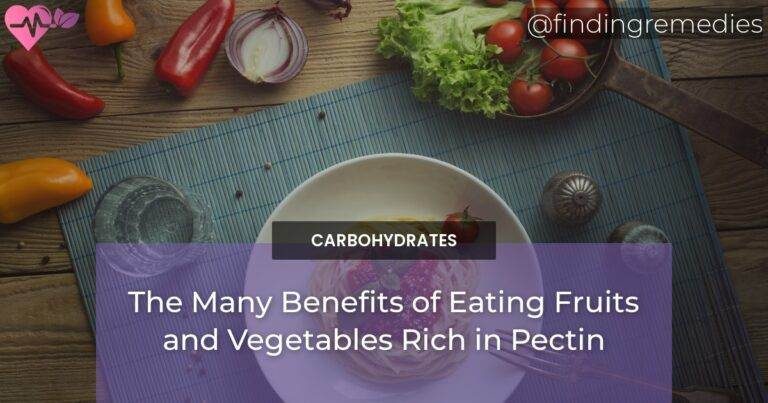Eating a diet rich in fruits and vegetables has long been associated with numerous health benefits. One component that contributes to these benefits is pectin, a type of soluble fiber found in various plant foods. Pectin offers a range of advantages, including its ability to lower cholesterol levels, control blood sugar, promote gut health, provide essential vitamins and minerals, and potentially aid in weight management and cardiovascular health.
Understanding the benefits of pectin foods can help individuals make informed dietary choices and improve their overall well-being.
Table of Contents
Pectin is a type of soluble fiber
Definition and characteristics of pectin
Pectin is a complex carbohydrate found in the cell walls of fruits and vegetables. It is classified as a soluble fiber because it dissolves in water and forms a gel-like substance in the digestive tract. This unique property of pectin allows it to provide various health benefits.
Pectin as a dietary fiber
Dietary fiber plays a crucial role in maintaining digestive health and preventing chronic diseases. As a soluble fiber, pectin helps regulate bowel movements, promotes satiety, and supports the growth of beneficial gut bacteria.
ALSO READ
Sources of pectin in fruits and vegetables
Pectin can be found in a wide range of fruits and vegetables, with some excellent sources including apples, citrus fruits, berries, plums, pears, carrots, and peas. Incorporating these foods into your daily diet can significantly increase your pectin intake.
Pectin can help lower cholesterol levels
Mechanism of action in reducing cholesterol
Pectin has been shown to lower cholesterol levels by binding to cholesterol molecules in the digestive tract, preventing their absorption into the bloodstream. This leads to a decrease in LDL (bad) cholesterol levels and promotes heart health.
ALSO READ
Research studies supporting the cholesterol-lowering effect
Several scientific studies have demonstrated the cholesterol-lowering effects of pectin-rich foods. For example, a study published in the Journal of Nutrition found that pectin supplementation significantly reduced LDL cholesterol levels in individuals with high cholesterol.
Recommended intake of pectin for cholesterol management
While there is no specific recommended daily intake of pectin, incorporating pectin-rich foods into a balanced diet can contribute to cholesterol management. Aim to include a variety of fruits and vegetables rich in pectin on a regular basis.
Pectin can help control blood sugar levels
Role of pectin in regulating blood sugar levels
Pectin helps regulate blood sugar levels by slowing down the absorption of glucose from the digestive system into the bloodstream. This can be particularly beneficial for individuals with diabetes or those at risk of developing the condition.
Effectiveness of pectin in managing blood sugar
Research suggests that incorporating pectin-rich foods into a balanced diet can help control blood sugar levels. A study published in the European Journal of Clinical Nutrition found that pectin supplementation reduced post-meal blood sugar spikes in individuals with type 2 diabetes.
Incorporating pectin-rich foods into a balanced diet for blood sugar control
To effectively manage blood sugar levels, it is important to include a variety of pectin-rich foods in your meals and snacks. Some examples include citrus fruits, apples, pears, and legumes. These foods provide a natural source of pectin and other essential nutrients.
Pectin may promote gut health and digestion
Pectin’s impact on gut microbiota
Pectin acts as a prebiotic, providing nourishment for beneficial gut bacteria. By promoting the growth of these bacteria, pectin supports a healthy gut microbiota, which is essential for digestion, nutrient absorption, and overall well-being.
Benefits of pectin for digestive health
The gel-like substance formed by pectin in the digestive tract helps add bulk to stools, promoting regular bowel movements and preventing constipation. Additionally, pectin can help soothe and protect the lining of the gastrointestinal tract.
Ways to increase pectin intake for improved gut health
To increase your pectin intake for improved gut health, consider adding more pectin-rich foods to your diet. Berries, such as strawberries and raspberries, are excellent sources of pectin. You can also incorporate pectin-rich vegetables like carrots and peas into your meals.
Eating pectin-rich fruits and vegetables provides vitamins and minerals
Nutritional value of pectin-rich foods
Pectin-rich fruits and vegetables are not only a great source of soluble fiber but also provide essential vitamins and minerals. These include vitamin C, potassium, folate, and antioxidants.
Importance of vitamins and minerals for overall health
Vitamins and minerals are essential for various bodily functions, including immune system support, energy production, and cell growth. Consuming pectin-rich foods ensures you are getting a wide array of beneficial nutrients.
Including pectin-rich foods in a nutrient-rich diet
To optimize your nutrient intake, aim to include a variety of pectin-rich fruits and vegetables in your overall diet. Consider incorporating colorful salads, smoothies, and stir-fries that feature pectin-rich ingredients.
Other potential benefits of pectin consumption
Pectin’s role in weight management
Pectin-rich foods can contribute to weight management due to their high fiber content, which promotes feelings of fullness and reduces overall calorie intake. Including pectin-rich foods in a balanced diet can help support weight loss or maintenance efforts.
Pectin’s impact on cardiovascular health
Research suggests that the cholesterol-lowering effect of pectin may contribute to improved cardiovascular health. By reducing LDL cholesterol levels, pectin-rich foods can help lower the risk of heart disease and stroke.
Possible anti-inflammatory properties of pectin
Some studies have indicated that pectin may possess anti-inflammatory properties. By reducing inflammation in the body, pectin-rich foods may contribute to the prevention or management of chronic inflammatory conditions.
Conclusion
Incorporating pectin-rich fruits and vegetables into your diet offers numerous benefits for your overall health. From reducing cholesterol levels and controlling blood sugar to promoting gut health and providing essential nutrients, pectin plays a vital role in maintaining a well-rounded and nutritious diet. By making these wholesome foods a regular part of your meals and snacks, you can reap the many benefits of consuming pectin-rich foods.

